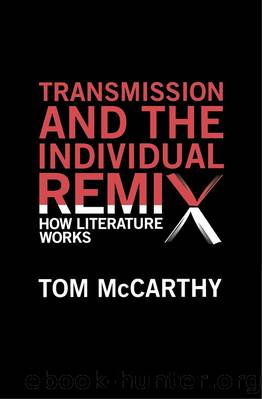Transmission and the Individual Remix by Tom McCarthy

Author:Tom McCarthy [McCarthy, Tom]
Language: eng
Format: epub
ISBN: 978-0-345-80327-6
Publisher: Knopf Doubleday Publishing Group
Published: 2012-05-22T00:00:00+00:00
VI
HOW, THEN, DOES LITERATURE WORK? In tagging my deliberations on this question to the myth of Orpheus, Iâm following the lead of (that is, reiterating, or perhaps modulating) the person who, in my opinion, has best addressed the question: Maurice Blanchot. In his short seminal 1955 text âThe Gaze of Orpheus,â Blanchot identifies in the Thracian poetâs fatal backward glance toward Eurydice an enactment of the very origin of literature. Itâs a moment, Blanchot writes, of madness, sacrifice, transgression; a moment when desire, surging and unmanageable, sweeps away all the writerâs previous concerns in a huge wave of âunconcernâ that carries the literary work itself beyond all boundaries, not least the very ones that gave rise to it in the first place (in Orpheusâs case, the parameters, the rules and limits, governing and shaping his task of bringing Eurydice back to life); a moment of surrender to an impulse thatâs at once both catastrophic and inspirational, that embodies inspiration itself. This, Blanchot continues, is the core, the primary spark, the big-bang moment, of all writingâand yet, at the same time, itâs a moment that could only âhappenâ after Orpheusâs poetry had already brought him to the Underworld and ushered him past its bouncers. âWhich is to say,â Blanchot concludes, âthat one can only begin to write if one is already writingââwhich is to say that writing has no origin. Or, to be precise, it means to say that writingâs origin will always lie within this blind spot off the map and out of timeâa spot whose retrieval is both impossible and the sole true task of any good writer (every significant literary work enacts, or reenacts, in some way or other, the doomed escapade of attempting to retrieve it, and surrenders itself to the consequences): an unsolvable quandary that leads Blanchot to tie writing to the act of suicide.
Blanchotâs contemporary Roland Barthes, although he doesnât mention Orpheus directly, follows a similar line, describing writing, in the well-known passage from his 1967 essay The Death of the Author, as the âdestruction ⦠of every point of origin ⦠the neutral, composite, oblique space where our subject slips away, the negative where all identity is lost, starting with the very identity of the body writing.â Itâs such a famous passage that Iâm almost embarrassed to cite it. But itâs famous for a reason: itâs important. It binds the act of writing not to integrity and presence, but rather to the opposite, to disintegration and becoming absent. It also, we might note in passing, answers our Kraftwerk question. Who speaks? For Barthes, the answer is always: languageâlanguage speaks me, you, everyone, to such an extent that I and you and we and they are merely shifting and amorphous points, floating islands being continuously made and unmade by languageâs flows and counterflows.
For our second Kraftwerk question, What is said?, we should turn back to Blanchot. His formulationâs more extreme than Barthesâs. Within literature, for Blanchot, itâs not just the writer whoâs prone to disintegration,
Download
This site does not store any files on its server. We only index and link to content provided by other sites. Please contact the content providers to delete copyright contents if any and email us, we'll remove relevant links or contents immediately.
The Power of Myth by Joseph Campbell & Bill Moyers(1068)
A Social History of the Media by Peter Burke & Peter Burke(988)
Half Moon Bay by Jonathan Kellerman & Jesse Kellerman(987)
Inseparable by Emma Donoghue(983)
The Nets of Modernism: Henry James, Virginia Woolf, James Joyce, and Sigmund Freud by Maud Ellmann(913)
The Spike by Mark Humphries;(812)
The Complete Correspondence 1928-1940 by Theodor W. Adorno & Walter Benjamin(789)
A Theory of Narrative Drawing by Simon Grennan(783)
Culture by Terry Eagleton(776)
Ideology by Eagleton Terry;(743)
World Philology by(719)
Farnsworth's Classical English Rhetoric by Ward Farnsworth(715)
Game of Thrones and Philosophy by William Irwin(712)
Bodies from the Library 3 by Tony Medawar(709)
High Albania by M. Edith Durham(705)
Adam Smith by Jonathan Conlin(695)
A Reader’s Companion to J. D. Salinger’s The Catcher in the Rye by Peter Beidler(689)
Monkey King by Wu Cheng'en(654)
Comic Genius: Portraits of Funny People by(652)
